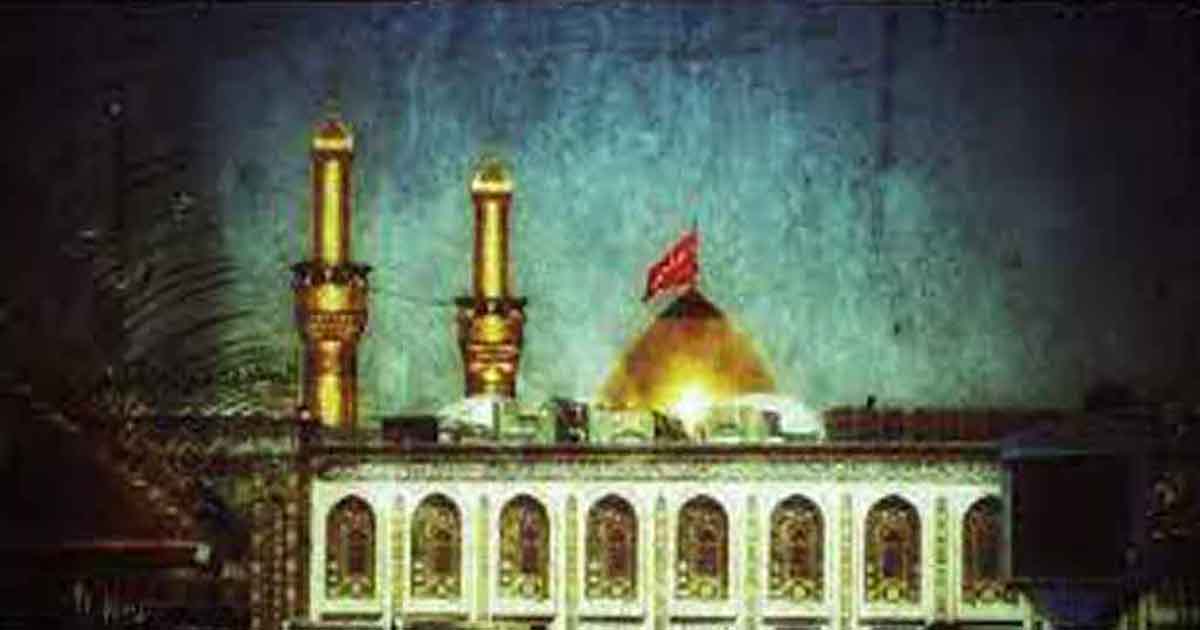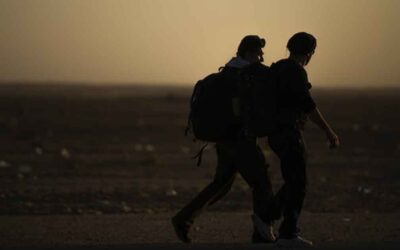When Imām Husayn (a.s.) intended going towards Makkāh, Abdullāh bin Muti’ came to meet him and said, “May I be your ransom! Where do you intend going”? Imām replied,
“Presently I have decided to go to Makkāh, after that I shall seek consultation from the Almighty.”
Abdullāh said, “May Allāh destine goodness for you! You may go to Makkāh, but lest you go to Kufā for it is an ill-omened city. Your father was assassinated therein and your brother was rendered helpless, was forsaken and wounded by a spear and it was near that he would succumb to that wound. You may remain attached to the Ka’bāh for you are the Master of the Arabs and the people of Hijaz (region of West Arabia, the barrier land, running parallel to the Red Sea and wherein lies the dual holy cities of Makkāh and Madinā) do not regard anyone else as your equal. The people therein will exert themselves to hasten to your aid, may I be your ransom, for if you are killed we shall be enslaved and conquered after you.”
Shaikh Mufeed says that Imām Husayn (a.s.) proceeded towards Makkāh taking the main roads reciting the following verse of the Qur’ān:
“So he went forth in fear, apprehending.” (Quran, 28:21)
Someone told him, “It would be better if we take a crooked road as Abdullāh bin Zubayr and avoid the main road, so that those in our pursuit might not reach you.” Imām replied,
“No by Allāh! I shall not forsake this road, until Allāh commands me further.”
Imām Husayn (a.s.) entered Makkāh on Friday the third of the month of Sha’bān reciting the following verse:
“And when he (Prophet Moosā) turned his face towards (the land of) Madyan, said: Maybe my Lord will guide me in the right path.” (Quran, 28:22)
When Imām Husayn (a.s.) settled in Makkāh, the people therein and those who had come for the Hajj (Annual Pilgrimage to Makkāh), and people from other towns came to meet him. Abdullāh bin Zubayr too was in Makkāh and had taken asylum near the Ka’bāh and prayed and circumambulated it. He too accompanied by other people came to offer his salutations to Imām Husayn (a.s.) once in every two days consequently or often more. Imām’s presence in Makkāh made him uneasy, for he knew that till the time Imām remained in Makkāh, the people therein would not pledge their oath of allegiance to him (for he too eyed the Caliphate). Because they held the Imām dear and considered him more worthy to rule over them.”
As regards the people of Kufā, when they received the news of the death of Mu’āwiyah they started vilifying Yazid. Besides they were informed that Imām Husayn (a.s.) had refused to swear the oath of allegiance to Yazid and had gone to Makkāh. While Abdullāh bin Zubayr too had fled to Makkāh with him and competed with him.
The followers (Shi’āh) of Imām gathered at the house of Sulaymān bin Surad Khuzā’i and discussed about the death of Mu’āwiyah and praised and glorified Allāh. Sulaymān arose and said,
“Mu’āwiyah is dead, and Imām Husayn (a.s.) has refused to swear the oath of allegiance to Yazid and has proceeded towards Makkāh. You are his and his father’s followers (Shi’āh), then if you desire assisting him and fighting his enemies, write to him and inform him about it. But if you fear lest you would turn sluggish and retreat, then do not betray him (by inviting him here).”
Everyone unanimously swore that they would support him and fight his enemies under his command and offer their lives for sacrifice. When Sulaymān heard this he invited them to write letters addressing to the Imām and they wrote as follows:
-Letters of the people of Kufa to Imām Husayn (a.s.)
“In the name of Allāh the Beneficent, the Merciful. To Husayn bin Ali (a.s.) from Sulaymān bin Surad, Musayyab bin Najabah, Rufā’ah bin Shaddād, Habib bin Mazāhir and other followers from the citizens of Kufā, the believers and Muslims. Peace be upon you! We praise and glorify Allāh before you, besides Whom there is no other Deity. Now then!
Praise be to Allāh that He has destroyed your obstinate enemy. The one (referred to Mu’āwiyah) who had leapt upon the Islāmic nation and snatched their affairs into his own hands and grabbed their booty and seized control of it without their consent. He killed the virtuous and spared the wicked ones. And he scattered the wealth of Allāh among the tyrants and the wealthy people, thus he was annihilated as (the people of) Samood were destroyed, and we have no Imām left with us (except you).
We request you to come to us so that Allāh may unite us upon the truth. No’mān bin Basheer is alone present in the palace, but we do not gather with him on the Friday (Prayers), nor do we go to him on the day of Eid. If we learn that you have proceeded to come to us, we shall drive him out from here until we pursue him to Syriā, Allāh willing. Allāh’s Peace and Blessings be upon you.”
They gave this letter to Ubaydullāh bin Musme’ Hamadāni and Abdullāh bin Wal Taymi and told them to hasten. They rushed until they reached Makkāh on the tenth of the month of Ramazān. Then the people of Kufā waited for two days and again sent Qays bin Mus-hir Saydawi, Abdul Rahmān bin Abdullāh bin Shaddād Arhabi, and Ammārah bin Abdullāh Saluli with hundred and fifty letters written by one, two, three or four people.
Then again after a lapse of two days they sent Hāni bin Hāni Sabee’i and Sa’eed bin Abdullāh Hanafi with a letter whose contents were as follows:
“In the name of Allāh the Beneficent, the Merciful. To Husayn bin Ali (a.s.) from his followers, believers and Muslims. Now then! Make haste, for people are awaiting you and hold no other opinion, hence hasten, hasten. Peace be upon you.”
Another letter was written by Shabas bin Rab’ee, Hajjār bin Abjar Ajali, Yazid bin Hāris bin Ruwaym Shaybani, Urwā bin Qays Ahmasi, Umro bin Hajjāj Zubaydi, and Muhammad bin Umro Tamimi which read as follows:
“Now then! The gardens have turned green and the fruits have ripened. If you desire, you may arrive here, the army is ready to defend you.”
When all the messengers gathered together, Imām read the letters and inquired from them about the people.
Sayyid ibn Tāwoos says that Imām Husayn (a.s.) arose and recited Prayers between Rukn and Makan (in the Ka’bāh) and desired goodness from the Almighty. Then he called for Muslim bin Aqeel bin Abi Tālib (a.s.) and apprised him about the situation and wrote a letter in reply to the people of Kufā.
Shaikh Mufeed says that Imām Husayn (a.s.) sent the following reply with Hāni bin Hāni Sabee’i and Sa’eed bin Abdullāh Hanafi, who were the last messengers (from Kufā):
“In the name of Allāh the Beneficent, the Merciful. From Husayn bin Ali to the noblemen among the Muslims and believers.
Now then! Hāni and Sa’eed have brought me your letters, they being your last messengers. I have realized your opinions through them and your judgment is that: There is no Imām over us. You come towards us, perhaps Allāh will unite us through you upon the truth and righteousness.
I send to you my cousin, my brother and a trustworthy person from among my family Muslim bin Aqeel. And I have instructed him to inquire about your affairs and write to me regarding it. And if he writes to me that your elders, the wise and the learned men hold the same opinion as your messengers have conveyed to me and as written in your letters, then I shall come to you quickly, Allāh willing.
I swear by my life, that he is not an Imām and guide except he who judges in accordance to the Book of Allāh, and establishes justice, and professes the True Religion and dedicates himself to the will of Almighty Allāh. Greetings.”
Then Imām Husayn (a.s.) called Muslim bin Aqeel bin Abi Tālib (a.s.) and dispatched him to Kufā with Qays bin Mushir Saydawi, Ammārah bin Abdullāh Arjee and Abdul Rahmān and Abdullāh, the sons of Shaddād Arhabi. He enjoined them with fear of Allāh to conceal their mission, besides advising them to be merciful, and that if they find people to be firm and resolute then they should immediately inform him.
References
Nafasul Mahmum, Relating to the heart rending tragedy of Karbala’, Sheikh Abbas Qummi, ISLAMIC STUDY CIRCLE, Mumbai, India





0 Comments